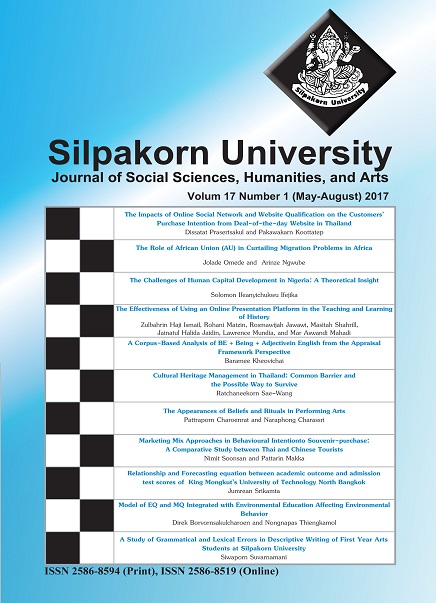Model of EQ and MQ Integrated with Environmental Education Affecting Environmental Behavior
Main Article Content
Abstract
The objective was to propose the structural model Emotional Quotient (EQ), Moral Quotient (MQ) and Environmental Education (EE) affecting environmental behavior for global warming alleviation through inspiration of public consciousness. The populations were 37,101 undergraduate student of Mahasarakham University in second semester of academic year of 2013. The Multi-stage simple random sampling technique was employed to collect the sample for 400 undergraduate students. The research instrument was the questionnaire and it was used for data collecting. LISREL was used for model verification. Results illustrated that the structural model confirmatory factors of Emotional Quotient (EQ), Moral Quotient (MQ) and Environmental Education (EE) were able to explain the variation of endogenous factors of Inspiration of Public Consciousness for Environmental Conservation (IPC) to cause Environmental Behaviors for Global Warming Alleviation (BEH) with 96.00 percent. IPC was the most effect to BEH with 0.69. Consequently, confirmatory factors of Environmental Education (EE), Emotional Quotient (EQ), and Moral Quotient (MQ), were able to explain the variation of confirmatory factors of Inspiration of Public Consciousness for Environmental Conservation (IPC) with 88.00 percent. EE was the effect to IPC with 0.49.
Downloads
Article Details
All rights reserved. Apart from citations for the purposes of research, private study, or criticism and review,no part of this publication may be reproduced, stored or transmitted in any other form without prior written permission by the publisher.
References
Bar-On, R. (2007) The Bar-On model of emotional intelligence: A valid, robust and applicable EI model. Organisations and People 14, 27-34.
Dictionary.com. (2010) Amorality. Retrieved on June 18, 2016, from https://www.dictionary.com/browse/amorality
Donkonchum, S., Thiengkamol, N. & Thiengkamol, C. (2012a) Causal Relationship Model of Environmental Conservation Behavior Integrated with LCA Knowledge. European Journal of Social Sciences 33(1), 5-13.
Goleman, D. (1995) Emotional Intelligence. New York: Bantam Books.
Gonggool, D., Thiengkamol, N. & Thiengkamol, C. (2012b) Development of Environmental Education Volunteer Model through Inspiration of Public Consciousness for Sustainable Development. European Journal of Social Sciences 32(1), 150-160.
IPCC.(2011) IPCC Introduces New ‘Climate Change’ Definition. Retrieved from: https://www.thegwpf.org/ipcc-introduces-new-climate-change-definition/
Johnstone, M. J. (2008) Bioethics: A Nursing Perspective. Elsevier Health Sciences, pp. 102–103.
Mayer, J. D., Salovey, P. & Caruso, D. R. (2000) In Sternberg, R. J. (Ed.). Handbook of Human Intelligence. 2nd ed., New York: Cambridge.
Morrasri, P., Thiengkamol, N. & Thiengkamol, T. (2012b) Causal Relationship Model of Little Green Child with Environmental Behavior. European Journal of Social Sciences 34(2), 177-189.
National Research Council of USA. (2010) Advancing the Science of Climate Change. Washington, D. C.: The National Academies Press.
Pimdee, P., Thiengkamol, N. & Thiengkamol, T.(2012a) Causal Relationship Model of Electrical Energy Conservation. European Journal of Social Sciences 32(3), 306-315.
Ruboon, O., Thiengkamol, N., Thiengkamol, T. & Kurokodt, J. (2012a). Model of Environmental Education Teacher with Inspiration of Environmental Conservation for Global Warming Alleviation. European Journal of Social Sciences 31(1), 92-102.
Stoltz, P.G. (1997) Adversity Quotient: Turning Obstacles into Opportunities. USA John Wiley & Son, Inc.
Superson, A. (2009) The Moral Skeptic. London: Oxford University Press.
Thiengkamol, N. (2009a) The Great Philosopher: the Scientist only know but Intuitioner is Lord Buddha. Bangkok: Prachya Publication.
Thiengkamol, N. (2009b) The Happiness and the Genius can be Created before Born. Bangkok: Prachya Publication.
Thiengkamol, N. (2010b) Urban Community Development with Food Security Management: A Case of Bang Sue District in Bangkok. Journal of the Association of Researcher 15(2), 109-117.
Thiengkamol, N. (2011e) Environment and Development Book 1. (4th ed.).
Thiengkamol, N. (2011f) Nurture Children to be Doctors. Bangkok: INTELLUALS
Thiengkamol, N. (2011g) Development of Energy Security Management for Rural Community. Canadian Social Science 7(5), October 31, 2011.
Thiengkamol, N. (2011h) Development of a Food Security Management Model for Agricultural Community. Canadian Social Science 7(5), October 31, 2011.
Thiengkamol, N. (2011i) Development of Model of Environmental Education and Inspiration of Public Consciousness Influencing to Global Warming Alleviation. European Journal of Social Sciences 25(4), 506-514.
Thiengkamol, N. (2011j) Model of Psychological State Affecting Global Warming Alleviation. Canadian Social Science 7(6), 89-95.
Thiengkamol, N. (2012a) Development of A Prototype of Environmental Education Volunteer. Journal of the Social Sciences 7(1), 77-81.
Thiengkamol, N. (2012c) Model of Psychological Trait Affecting Global Warming Alleviation. European Journal of Social Sciences 30(3), 484-492.
Thiengkamol, N. (2012d) Model of Psychological Factors Affecting Global Warming Alleviation. International Proceedings of Economic Development and Research 44, 6-12.
Thiengkamol, N. (2012e) Causal Relationship Model of Environmental Education. Mediterranean Journal of Social Sciences 3(11), 11-18.
Thiengkamol, N. (2012f) Causal Relationship Model of Environmental Education and Psychological Trait. Mediterranean Journal of Social Sciences 3(11), 263-272.
Thiengkamol, N. (2012g) Causal Relationship Model of Four Noble Truths. Mediterranean Journal of Social Sciences 3(11), 319-326.
Thiengkamol, N. (2012h) Model of Environmental Education and Psychological Factors Affecting Global Warming Alleviation. Mediterranean Journal of Social Sciences 3(11), 427-436.
Udonboon, C. Thiengkamol, N. & Thiengkamol, C. (2012b) Causal Relationship Model of Water Conservation Behavior. Mediterranean Journal of Social Sciences 3(11), 591-604.
United States National Academy of Sciences. (2008) Understanding and Responding to Climate Change. Retrieved from https://americasclimatechoices.org/climate_change_2008_final.pdf
Waewthaisong, S. Thiengkamol, N. & Thiengkamol, C. (2012a) Causal Relation Model of Environmental Traveling Behavior. European Journal of Social Sciences 33(1), 184-195.
Wiktionary. (2010) “Aamoral”. Retrieved September 09, 2010. “(of people) not believing in or caring for morality and immorality”.
World Commission on Environment and Development (WCED). (1987) Our Common Future. Oxford: Oxford University Press. The Brundtland Report. United Nations World Commission on Environment and Development. Retrieve from https://en.wikisource.org/wiki/Brundtland_Report.

